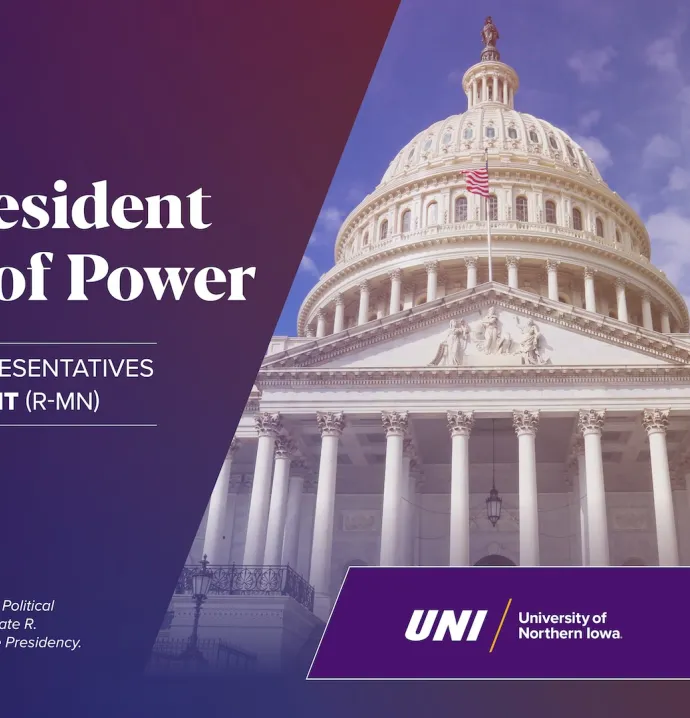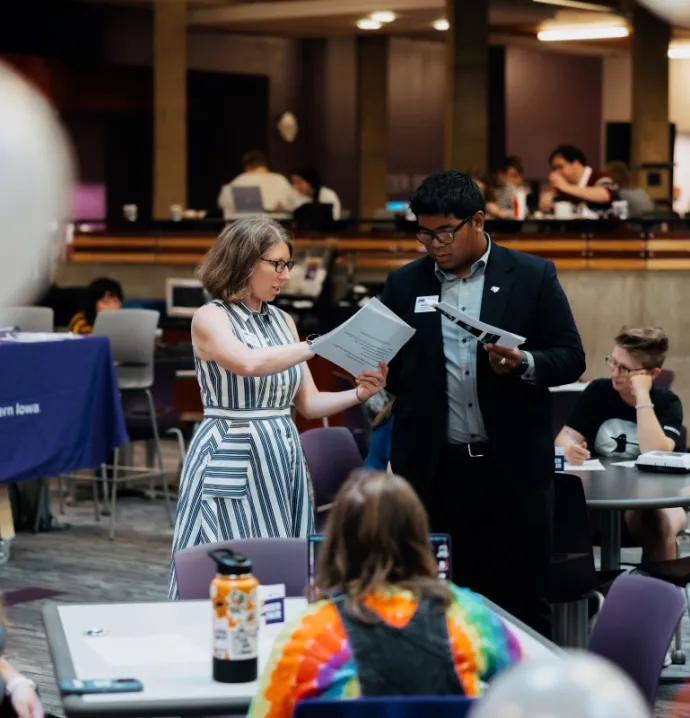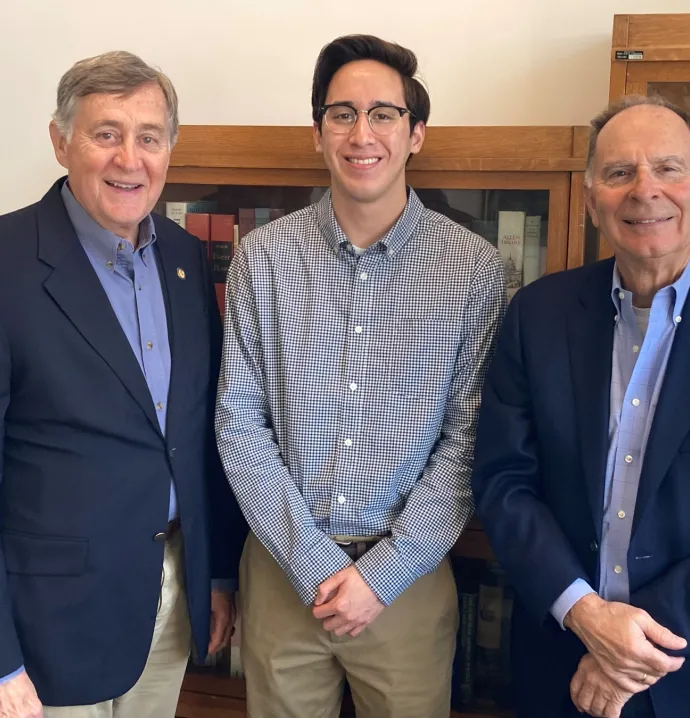UNI professor discusses the future of policing
UNI professor discusses the future of policing
The death of George Floyd reawakened demands for police reform across the country. From calls to defund police departments, to reexamining use-of-force policies, policing practices are once again falling under scrutiny. Here, University of Northern Iowa criminology professor Gayle Rhineberger-Dunn discusses these topics and the role UNI plays in preparing future criminal justice professionals.
What is your work at UNI focused on?
I am a professor of criminology. I teach classes on criminological theory, crime and inequality, criminal justice ethics, ethical communication for criminal justice professionals, media and crime, and our criminology senior seminar. My senior seminar class focuses on the work experiences of criminal justice professionals, such as job stress, job satisfaction, secondary trauma, burnout, etc. In every class I teach I incorporate themes of inequality, racism, discrimination, implicit bias, and ethics. I challenge my students to be reflective of their minds and bodies, to think about the person they are right now, the person they want to be and the criminal justice professional they want to be.
My research focuses on the workplace experiences of probation/parole officers and juvenile probation and juvenile detention officers, as well as media portrayals of crime and criminal justice professionals.
What role does UNI play in training police officers?
First let me say that we don’t teach towards one career population. Some of our students want to go into law enforcement, while others want to go into community or institutional corrections,community corrections, advocacy work, or work with at-risk youths.
Second, training implies some specific skills like stop and frisk or how to write a search warrant. That isn’t our job. Students will learn those skills in the police academy. Our goal is to provide a broad education on criminal justice issues while emphasizing higher-order thinking skills. These include the ability to think critically and ethically in fast-paced working environments, as well as oral and written communication skills. We’re trying to get our students to think more deeply and have the mental tools to think quickly while maintaining ethical and critical focus. We want our students to be self-disciplined, empathic, respectful, ethical and aware of the differences in people and circumstances.
The research is clear that a four-year degree matters in policing. Officers with a four-year degree have few disciplinary issues, fewer use of force complaints and are less likely to use force in general. They also tend to have greater job satisfaction, less job stress, less burnout and less secondary trauma. Officers who have greater burnout and greater job stress and secondary trauma are more likely to use force in times of stress.
What has been your reaction to the death of George Floyd and the calls for police reform that have followed?
George Floyd’s death was a horrific, unnecessary homicide by police officers. The last couple months have been a struggle for many criminologists across the country. We are aware that we’re teaching students planning to work in the criminal justice system, particularly in policing. We want our students to be successful in getting jobs and to go home safely at the end of the day. But we also want them to treat people humanely, to be respectful and culturally aware, to remember to treat people as individuals. We can teach these skills and values, but after they spend two to four years with us, our students go to the police academy and field training in their home departments. That is when everything changes, and not necessarily a good way. The academy is focused on keeping officers safe, teaching control and self-defense techniques, legal elements of enforcement, physical fitness, and reinforcing a police culture that emphasizes an “us versus them” mentality. It is not focused on teaching officers how to be self-reflective, to recognize their implicit biases and how to overcome them so that they treat people humanely and as individuals.
In recent days, the notion of defunding or dismantling police departments has risen to prominence. Can you explain what defunding or dismantling means?
I care deeply about our students, and as such, I strongly support police reform. It is absolutely necessary not only for public safety, but also for the safety of officers. There are differences between reform and defund. Reform is about making changes to police activities, responsibilities and policies, such as use of force policies. Defunding is different. Currently, there is no unified definition of what defunding or dismantling looks like. There seems to be a growing consensus that “defund” doesn’t mean removing all police officers. Rather, it means reallocating some money that’s currently going to police to other social services that are continuously losing money. Reallocating funds from militaristic policing resources to quality of life issues, to drug treatment programs, mental health programs, domestic violence programs, homelessness issues, and more. It means reallocating money to these kinds of social services, particularly in minority communities. Many times these quality of life services are not in the marginalized areas that need them the most. Defunding and reallocating those funds to these neighborhoods and services would benefit not only the individuals who need those services, but it would also benefit the police. If these services are available, then police officers aren’t being called to deal with them.
Research shows that having more police in an area does not mean less crime. Having more police in a neighborhood does not reduce crime if police are there for enforcement purposes. There’s only one way to create crime - to make a law against a behavior and have someone enforce it. Police are responding to behaviors that have been criminalized, such as drug use, homelessness and mental health. Having less police might mean less crime, in part because people won’t be reporting it, but it’s also true that if we cut down the police force it can completely change a city. Take Camden, New Jersey, for example, which did in fact defund and dismantle their police department in 2012 as a result of extreme corruption and excessively high crime rates. They broke the police department down to nothing and rebuilt it. They did end up rehiring about 100 of their officers. Now in a place they used to call heroin highway, police are having BBQs with neighborhood residents.
Conversations and movements magnified by the protests have also focused on police use-of-force policies. Can you explain what use-of-force policies are? Are these policies in need of reform?
Use-of-force is about how much force can or should be used in specific contexts or instances. The general consensus is that it should be the minimal use of force necessary to quell the current threat. There is most definitely a need for reform in use of force policies. New protocols can and should be focused on de-escalation techniques. The literature is very clear that de-escalation techniques are needed. Police departments that require officers to intervene and stop excessive use of force by other officers plus a requirement for officers to report their own use of force and that of other offices seems to work in terms of reducing not just use of force complaints, but also the use of force generally, including verbal force.
I’m teaching a class this fall on communication ethics. We're reading a book on how to read body language. My purpose in assigning this text is to flip it around and have students spend time self-reflecting on their own body language. How are people responding to them when they enter a room or interact with others? How might their own body language change the atmosphere and the outcome of a police call? I often talk to my students about taking things personally. If you are someone who takes things very personally, being a police officer might not be the best job for you. It’s not really about you. People react to the uniform and what they perceive that uniform stands for. They don’t know you. If they call you names or even spit on you, it isn’t about YOU as a person. It is typically more often about the uniform. But some people take these kinds of actions as a personal attack and as an affront to their position of authority, resulting in excessive use of force.
We need to be careful. We need officers to be safe and be able to defend and protect themselves and others. Increased training on de-escalation techniques would be helpful in reducing use of force incidents, which would actually serve to decrease injuries to officers as well as protecting the public.
What role has implicit bias played in policing?
Implicit bias is not new. It has existed forever. It encompasses all of the unconscious actions and words we use in our interactions with others. At UNI, we do not have a class on implicit bias, but discussions of implicit bias are generally built into our classes. We are very aware that our students need to understand what implicit bias is and the implications it has for the people they encounter in their jobs (as well as their personal lives). Implicit bias by police officers greatly impacts the lives of people of color, people with different abilities and people with mental health issues. It can literally mean life or death.
People get upset and say, ‘How do you know Michael Brown’s murder in Ferguson or George Floyd’s murder in Minneapolis is racist?’ Here’s something to think about: The research shows us that the rate of police killing of Black people is much higher (nearly three times higher) than the rate of white people. Many people do not believe this. They say ‘look at the numbers. More white people are killed by police than Black people,’ Ok. Let’s look at the numbers. A 2016 study by DeGue, Fowler and Calkins looked at all law-enforcement use of force deaths from 2009 to 2012. Of the 812 total deaths, 52% were white individuals and 32% were Black individuals. When you take into account that the Black population is about 12 percent of the entire US population, but 32% of deaths by police, and white people make up 70% of the U.S. population and 52% of deaths by police, this is what we call a disparity. Black people are killed at a much higher rate than white people. One city could have 50 murders in a year while another might have 100. But if the place that had 50 murders had a population of 200 people and the place that 100 murders had a population of 2,000, murder rates are higher In the city with 50 murders. City A with 50 murderers out of 200 people, has a murder rate of 25 people for every 100 people in the population. City B with 100 murders out of a population of 2,000 people has a murder rate of 5 people for every 100 people. Do you want to live in the city that has 50 murders or do you want to live in the city that has 100 murders? You live in the city with 50 murders and your chance of being murdered is higher than your chance of being murdered in the city with 100 murders.
For example, a police officer who shows up and puts his/her hand on their gun when they’re talking to a Black person, and they don’t do that in the same kind of situation with a white person, that is implicit bias. The officer may not even be aware of the difference in how he/she acts. The difference in hand placement is based on the stereotype that Black men are more violent and dangerous than white men. That erroneous stereotype is so ingrained in people’s brains that they respond to it without knowingly doing so. This is a problem. Everyone, but particularly police officers because of the potential deadly outcome, need to be much more self-reflective and aware of their own biases so that they can begin to change how they act
I don’t think that police academies do enough. Some police academies may talk about it and have diversity training, but generally speaking diversity training doesn’t work. That’s what the literature shows. The people who are deeply unaware and don’t want to be aware are never going to get anything out of those training. We’ve had this kind of training in policing for decades, and it doesn’t work.
Why has it historically been so difficult to fire or discipline police officers with numerous complaints on their records?
It’s not that they can’t fire them, it’s that they don’t want to. No one knows what police go through except other police officers. General citizens think of police activities as crime fighting-related actions like arrests and chasing criminals. Not everyone understands that police have to see and hear things that other people don’t. Officers working accidents see decapitated children and adults, or worse yet, people who will die in front of them before an ambulance can get to the scene. They have to watch images and read documents related to child porn, sexual assault and horrific child abuse. Because people outside the profession don’t get the toll that it takes on the mind and body, so police and their supervisors tend to stick together and have each other’s backs, including lying and pretending not to see fellow officers engaging in brutal treatment of others. Make no mistake…. Dealing with these terrible things is not an excuse or a justification for bad police behavior, for corrupt officers, or racist cops who kill innocent Black men and women. But knowing reasons for it can help inform us how to go about making reforms to policing in this country.
What it would take to be really diligent about disciplining and firing officers is officers, particularly supervisors, who don’t buy into the thin blue line, who shut down misconduct and racist and sexist comments as soon as they see or hear it. You’d have to have supervisors willing to shut it down. Good supervisors make all the difference. They don’t let officers get by with telling racist, homophobic or sexist “jokes.” Instead, they immediately call the behavior out for what it is--racist, homophobic or sexist behavior that harms both fellow officers as well as members of the general public with whom these officers interact with. If a supervisor says we treat everyone equally in that department, and they actually do it, that changes the culture in that department.
What does the future of policing look like?
Now is a great time to be a police officer if you’re someone who cares about social justice and wants to help change the system. If you want to be part of reform, this is the time to complete your four-year degree in criminology or criminal justice and apply for jobs as a police officer. We should see a significant number of changes in police training and job expectations over the next few years. The process is going to be painful, and it will take dedicated individuals to help work through the reform process. My fear is that we will see an even greater decrease in the number of qualified people applying for police jobs, particularly individuals who would make excellent police officers. Police departments have seen a significant decline in the number of applicants over the years as police behavior has come under greater scrutiny. There are plenty of positions available, and not always enough qualified applicants.




